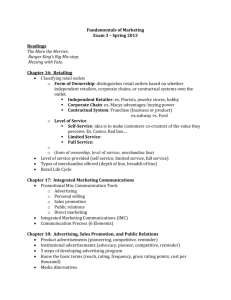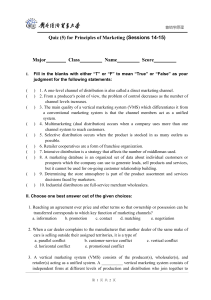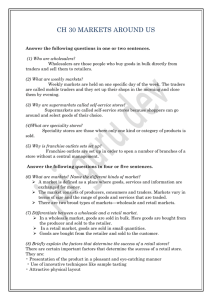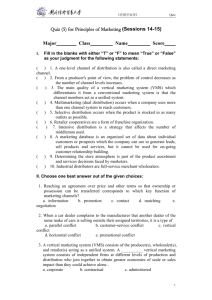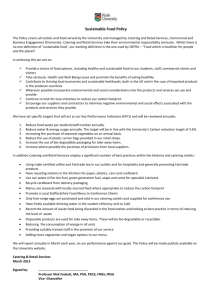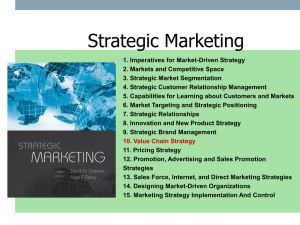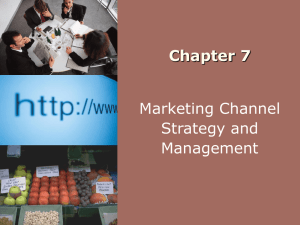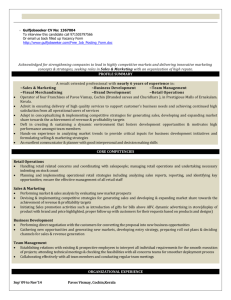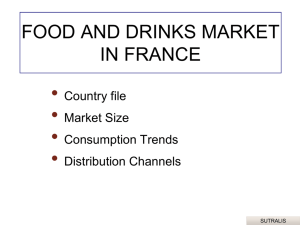File
advertisement
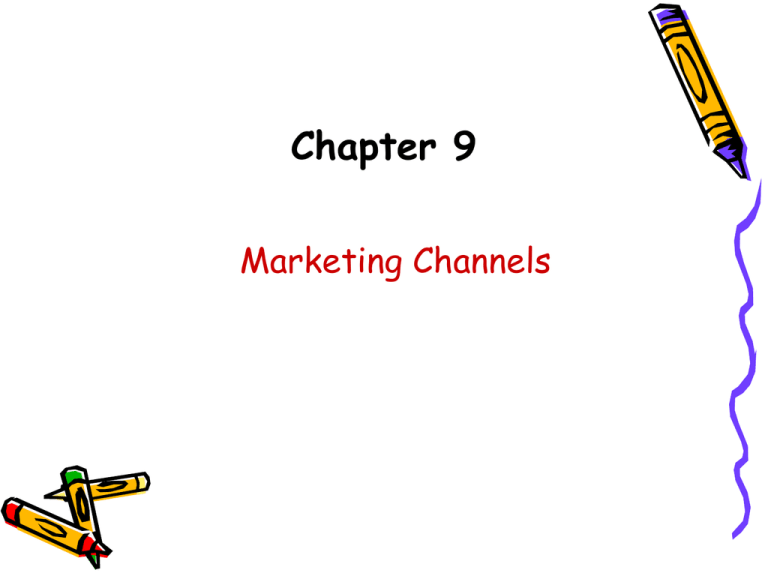
Chapter 9 Marketing Channels Channel Functions • • • • • • • • Information gathering Consumer motivation Negotiating with suppliers Placing orders Financing Inventory management Risk bearing After sales support SDM- Ch 9 2 Channel Functions……. A • • • • • Physical reach Customer contact Building relationships Market feedback Understand market trends and keep principals informed • Handle price risks • Finances market credit and inventory holdings • Provide after sales service SDM- Ch 9 3 Role of Intermediaries Company 1 Company 2 Company 3 Intermediary Large number of CONSUMERS SDM- Ch 9 Direct and Indirect…. 4 Channel Flows • Forward flow – company to its customers – goods and services • Backward flow – customers to the company – payment for the goods. Returned goods. • Flows both ways - information SDM- Ch 9 5 Three Flows Recognized Goods and Services FORWARD BACKWARD Payment for goods / returns Information Company SDM- Ch 9 BOTH WAYS Customers 6 Channel Flows • Some channel member/s have to perform them • There is a cost associated with each flow • If a channel member is discontinued, the flow has to be performed by another • All flows and transactions can be effective only with timely, accurate and correct information • The channel flow is ideally to be handled by the most competent channel member who can deliver best service at the lowest cost. SDM- Ch 9 7 The Five Channel Flows • Physical flow • Title flow of goods (negotiation, ownership and risk sharing also) • Payment flows (financing and payment) • Information flow (about goods, orders placed and orders executed) • Promotion flows SDM- Ch 9 8 • Physical flow :-transportation and storage of the product in order to physically deliver the product to end-user • Title flow (i) Ownership :- nominally taking title to the product so that in case the product is damaged or lost due to any reason ,the loss is accounted for (ii) Promotion :- promoting the product to the customers in several ways like advertising ,displaying demonstrating ,giving information about ,etc (iii) Negotiating :- coming to an agreement about the terms of trade with the upstream and down stream entities in the channel including the customer • Financing :- taking care of the financial requirement of the members of the channel • Ordering payment :- receiving and recording the orders, consolidating it and passing it on to the upstream receiving payments ,recording it, consolidating it , and passing it on to the upstream Degree of Involvement Manufacturer Physical Title / ownership Information Risk sharing Promotions SDM- Ch 9 C&FA or Distribution Center Physical Title Information Payment Order processing Distributor, dealers Physical Title / ownership Information Payment Order placement Negotiation Risk sharing Promotions Wholesaler or retailer Physical Title / ownership Information Payment Order placement Negotiation Risk sharing Promotions Channel formats… 11 Channel Formats • Is decided by who ‘drives’ the channel system: – – – – Producer driven Seller driven Service driven Others SDM- Ch 9 12 Producer Driven • This is the effort of the manufacturer to reach the product to his consumers. Examples: – Company owned retail outlets – petrol, Bata, Reliance mobiles – Licensed outlets – KMF – Consignment selling agents – Franchisees – Brokers – Vending machines SDM- Ch 9 13 Seller Driven • Use of existing channels to reach the largest number of end users – – – – Existing wholesalers and retailers Modern retail formats Specialty stores Discount stores – like the eralier Subhiksha – Pheriwalas SDM- Ch 9 14 Service Driven • These are the people who facilitate the distribution – – – – – Transporters and freight forwarders Providers of warehouse space C&F agents 3P Logistics service providers Couriers SDM- Ch 9 15 Other formats • Multi-level marketing systems – Amway, Tupperware • Co-operative societies • TV home shopping • Catalogue marketing • The internet • Exhibitions, fairs and trade shows • Data base marketing Channel levels… SDM- Ch 9 16 Channel Levels • Zero level – if the product or service is provided to the end user directly by the company. – Used mostly by companies delivering service like health, education, banking (also known as service channels) • One level – consists of one intermediary • Two level – consists of two intermediaries and is the most common for FMCG products SDM- Ch 9 17 Service Channel • Companies establish their own unique channels to deliver services like health, education, banking, insurance etc – Hundreds of bank branches to be close to prospects – Banks may also recruit independent agents to get customers to walk in – Musician or magician may use mass media, events or web sites to reach customers SDM- Ch 9 18 Marketing Channel Systems • Vertical: – Corporate – Administered – Contractual • Horizontal • Multi-channel SDM- Ch 9 Vertical…. 19 Vertical Marketing System • Various parties like producers, wholesalers and retailers act as a unified system to avoid conflicts • Improves operating efficiency and marketing effectiveness • 3 types: – Corporate – Administered – Contractual Corporate… SDM- Ch 9 20 Corporate VMS • Combines successive stages of production and distribution under single ownership • Examples: – Bata, Bombay Dyeing, Raymond SDM- Ch 9 Administered… 21 Administered VMS • Co-ordinates distribution activities • Gains market power by dominating a channel • Usually true of dominant brands like GE, Kodak, Pepsi, Gillette, Coke and HLL in certain locations – Command high level of co-operation in shelf space, co-operation from resellers, displays, pricing policies and promotion strategies Contractual… SDM- Ch 9 22 Contractual VMS • Independent producers, wholesalers and retailers operate on a contract • Could take the forms of: – Wholesaler sponsored voluntary chains – Retailer co-operatives – Manufacturer sponsored retail or wholesale franchise – Franchise organizations – Service firm sponsored retail franchise SDM- Ch 9 23 Horizontal MS • Two or more unrelated companies join together to pool resources and exploit an emerging market opportunity – In-store banking in hotels, big stores – Retail outlets in petrol bunks – Coffee Day outlets in airports Multi-channel… SDM- Ch 9 24 Multi-channel Distribution • Company uses different channels to reach / same or different market segments – Most FMCG companies have separate networks for retail market and institutions – Most B2B firms use multi-channels for customer segments like Government, institutions etc SDM- Ch 9 25 Multi-channel Distribution • Used in situations where: – Same product but different market segments – Unrelated products in same market – detergents and ice creams (HLL) – Size of buyers varies – Geographic concentration of potential consumers varies – Reach is difficult • Benefits include lower cost, better market coverage and customized selling SDM- Ch 9 26
